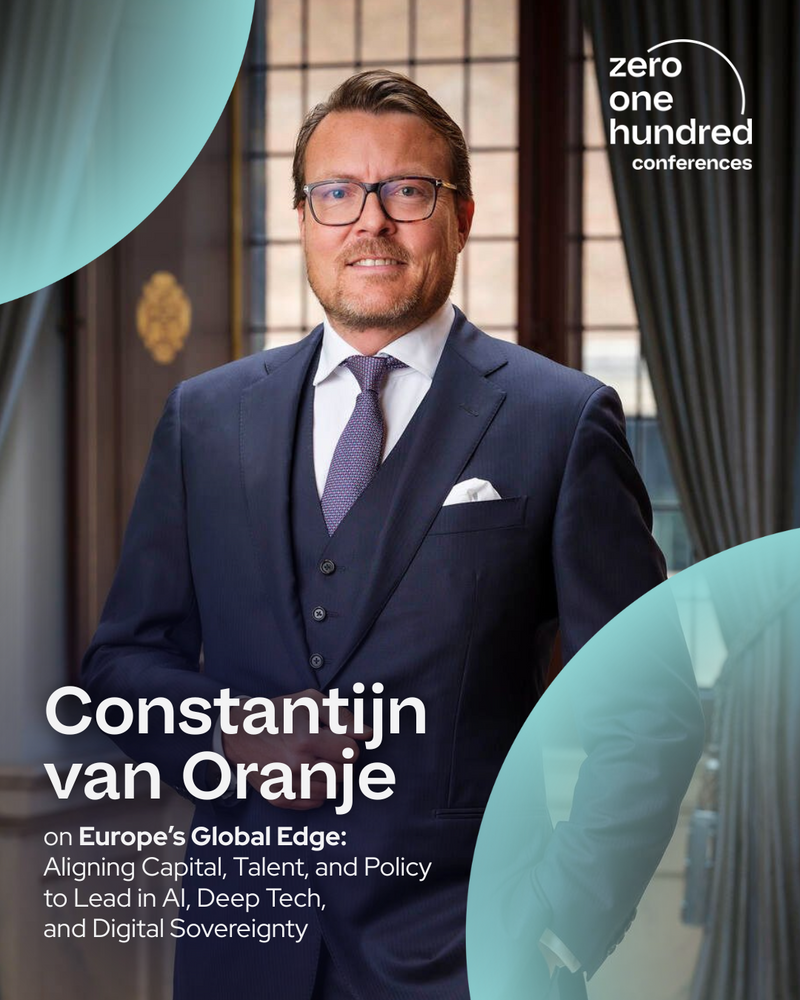As Special Envoy at Techleap, Constantijn van Oranje-Nassau has long championed Europe’s ambition to lead in innovation. In this exclusive interview, he shares his outlook for 2025 and beyond — from the rebound of the IPO market to the rise of deep tech, defense, and AI. He discusses the urgent need for Europe to scale its impact-driven startups, build a more unified tech policy, and rethink investment models to secure long-term competitiveness in critical technologies. With insights on transatlantic dynamics, regulatory hurdles, and the talent imperative, Constantijn outlines a bold vision for how VCs, governments, and industry must align to shape Europe’s future on the global stage.

As we look ahead to 2025, what key trends and challenges do you foresee shaping the European Private Equity and Venture Capital landscape, and how should investors adapt to these shifts effectively?
Despite ongoing uncertainties in Europe, such as debates around trade tariffs, we see a strong sense of optimism. Rapidly growing markets present a crucial opportunity for Europe to maintain a competitive role on the global stage. Within the region, there is significant potential, and we hope to see a rebound in the IPO market.
We are closely watching the number of exits: Will we see more in 2025?
This could be significantly impacted by macroeconomic trends, particularly U.S. policy, given that most IPOs still take place there. Therefore, it will also be interesting to observe M&A activity and how it evolves. Additionally, DPI will be crucial for many funds looking to raise their next round.
Beyond this, AI remains a dominant trend, affecting both fundraising, e.g., seedstrapping and the metrics now required to raise specific rounds, as well as go-to-market strategies and product development. AI will be a key driver in improving operational efficiency across industries.
The U.S. vs. Europe dynamic remains a major topic: Will founders still look to relocate to the U.S. given recent policy changes? And what steps will Europe take to retain top entrepreneurial talent?
We will continue to see a strong focus on deep tech, hardware, and other capital-intensive businesses, which require diverse funding solutions, including government support, industry collaboration, and a stronger partnership between VCs, private equity, and industrial players.
And last but not least: regulation. AI policies must evolve to keep pace with developments in the U.S. and China, while Europe must work toward a more unified and business-friendly tech policy to remain competitive on the global stage.
Given the increasing need for Europe to secure its position in critical technologies, how can the venture capital and ecosystem be a driving force in reducing dependency on foreign tech giants? Which sectors should receive the most strategic focus?
To safeguard Europe’s competitiveness and future economic strength, accelerating technological innovation and scaling startups is crucial. Key areas of focus include deep tech sectors such as photonics, quantum computing, and semiconductors, as well as climate tech, energy, and the circular economy. Additionally, defense tech is rapidly emerging as a critical industry, alongside all domains related to digital sovereignty.
We need more collaboration between different asset classes and large industry players to be more involved in terms of paying upfront and strategic investing. As well as a risk-on mentality from VC funds.
European startups often struggle to scale, particularly those focused on deep-tech and impact-driven solutions. What are the key barriers preventing these companies from achieving global scale, and how can investors help bridge the gap?
One of the biggest challenges for European startups is scaling beyond their initial markets. The key barriers they face typically revolve around growth capital, talent, and regulation.
Access to specialized talent, especially in fields like AI, quantum, and climate tech, is a significant constraint. Startups need experienced leadership and technical expertise to navigate global expansion successfully. While European VC investment remains strong, deal volumes have fluctuated, and deep-tech startups often require patient capital due to their longer development cycles. Additionally, expanding into international markets is critical for scaling, yet many European startups struggle to make this leap quickly enough.
More growth capital, reduced barriers between European countries, and increased industry collaboration would enable European startups to scale more effectively, driving greater societal and economic impact.
Many impact-driven innovations require longer investment horizons than traditional VC models allow. How should European investors rethink their strategies to balance financial returns with long-term societal and environmental benefits?
European investors are already adapting to the longer investment horizons required for impact-driven innovations. This shift is reflected in changing LP terms, with many VC funds extending their lifecycle and incorporating more flexible structures. Additionally, we see a rise in evergreen funds and the involvement of family offices, which allows for a longer-term approach without the traditional pressure of short exit timelines.
Beyond private capital, collaboration with governments and industry is crucial. Public-private partnerships, strategic funding initiatives, and regulatory support can help de-risk investments while ensuring that long-term societal and environmental benefits remain a priority.
Talent is a key driver of innovation, yet Europe faces challenges in attracting and retaining top entrepreneurs and tech leaders. How can investors, governments, and the private sector collaborate to create an ecosystem that nurtures and sustains world-class talent in Europe?
Attracting and retaining world-class talent requires alignment from investors, governments, and the private sector.
One critical factor is taxation: more competitive tax policies on both salaries and capital gains can make Europe a more attractive destination for top entrepreneurs and tech leaders. Reducing regulatory burdens and creating a more business-friendly environment will also be essential.
Additionally, increased investment in infrastructure is crucial. This includes funding for education and R&D programs to build a strong talent pipeline, as well as investments in foundational infrastructure such as data centers and energy solutions and other facilities to support deep-tech and high-growth industries.

